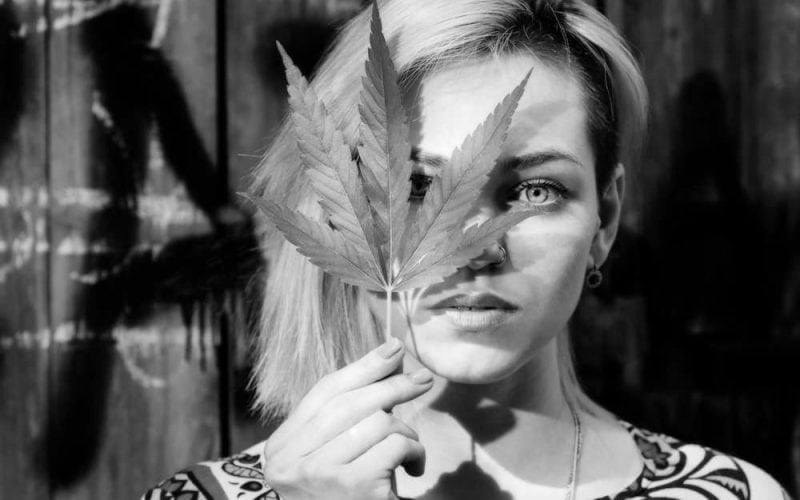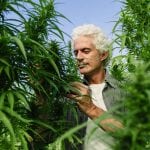
Chronicle Book Review: "This Is Your Mind on Plants" by Michael Pollan
Rerolled: August 19, 2021 | #STDW
Chronicle Book Review:This is Your Mind on Plants by Michael Pollan (2021, Penguin Press, 274 pp., $28.00 HB)
[image:1 align:left]A long time ago, in the days of Ronald Reagan, I once fell into conversation with an indigenous campesino at a rustic roadside café on a lonely road through the Sierra Madre Mountains in the state of Oaxaca, long notorious for its marijuana cultivation. We conversed in Spanish, a second language for both of us, about peasant life thereabouts and, eventually, about la mota.
One remark he made has stayed with me to this day: "How can a plant be illegal?" he wanted to know. This was not a question of understanding legal systems, but of wrapping his native head around the arrogant Western notions that plants—an essential part of nature and the source of much healing—are "good" or "bad" and that we can decree part of nature to be a crime.
Renowned foodie and plant author Michael Pollan has long dealt with that question, not so much wrestling with it as observing and noting the absurd, arbitrary, capricious, and historically-contingent laws privileging some psychoactive plants—coffee or tea, anyone?—while demonizing and even criminalizing others. He took on marijuana (as well as apples, potatoes, and tulips) The Botany of Desire (2002) and plant- and fungi-based psychedelics (as well as synthetics) in How to Change Your Mind (2018).
And now he's back with This Is Your Mind on Plants, in which he examines our relationship with three psychoactive plants, opium, caffeine, and the mescaline-bearing cacti peyote and San Pedro. Pollan recognizes that such plants are not good or bad, but good and bad—they can heal and stimulate and they can addict and kill (or in the case of psychedelics, really mess with your head)—and relates how the original Greek word for drug, pharmakos, meant both medicine and poison. Prohibitions crush such subtle understandings beneath demonizing dogma. As Pollan notes in his introduction:
But the blunt instrument of a drug war has kept us from reckoning with these ambiguities and the important questions about our nature they raise. The drug war's simplistic account of what drugs do and are, as well as its insistence on lumping them all together under a single meaningless rubric, has for too long prevented us from thinking about the meaning and potential of these very different substances. The legal status of a molecule is one of the least interesting things about it. Much like a food, a psychoactive drug is not a thing—without a human brain, it is inert—but a relationship; it takes both a molecule and mind to make anything happen.
The legal status of a molecule may not be of much interest to Pollan—he acknowledges his privilege as he admits he's not really afraid of getting busted for the peyote cactus in his Berkeley garden—but it has cast shadows over some of his research, particularly his chapter on his experience growing opium poppies, written in the 1990s and originally published with some "how to" pages removed out of fear of possible federal persecution.
Opium poppies, the plants that produce morphine and all its derivatives, such as heroin, are legal to buy and grow in the United States but make that first cut on a mature seed pod to release the opium sap and you could find yourself looking at a federal drug manufacturing charge. Or, worse yet, have the feds think you know too much about how you get morphine from your pretty flowers and you could get yourself arrested for possessing legal poppy straw that you bought at the local flower shop.
That's what happened to Jim Hogshire, author of Opium for the Masses, the book that inspired Pollan's opium article in the first place. Hogshire's persecution, which occurred as Pollan was growing his own poppies, made him acutely concerned about the legal status of the molecule and the murky borderlines where one transforms from avid gardener into drug manufacturer. The chapter is chilling remainder of Clinton-era war on drugs paranoia, but also of DEA stupidity. While quietly seeking to suppress a handful of amateur poppy-growing gardeners, it was busily ignoring what would prove to be the actual opium epidemic of our time, the prescription opioid epidemic led by PerduePharma, which rolled out OxyContin in 1996, the same year the feds were going after the gardeners.
Pollan quit drinking coffee for his chapter on caffeine. He writes that he usually takes drugs he writes about because he feels he has to to understand them, but that with coffee, to which he like hundreds of millions of others around the planet is addicted, he felt that he had to experience life without the miracle molecule. It didn't go well, but he survived to tell the tale.
And it's a tale, of coffee's role in the making of industrial civilization. Caffeine, after all, Pollan notes, made the night-shift possible, improved concentration, and increased worker productivity. Of course, it's a legal drug! That despite it occasionally being banned, the denizens of European coffeeshops being suspected of being quite clear-headed, argumentative, and capable of political subversion, not to mention the mingling of classes that went on. With coffee, England roused itself from its alcoholic haze and went on the conquer the world.
In his chapter on mescaline, Pollan writes about his adventures with the San Pedro cactus, a mescaline-bearing succulent like peyote (although not as potent), which, unlike peyote, is legal in the United States. But as with his experiment with poppy growing back in the '90s, Pollan runs into legal ambiguity: When does growing a San Pedro cross the line into manufacturing mescaline?
To be accurate, peyote is not completely illegal in the US. Bizarrely enough, it is a substance whose legality is not determined by itself but by who is consuming it. If you are a member of the Native American Church, it is legal. If you're not, it's not. That's weird, but it does at least protect the ability of Native Americans to consume peyote, which is central to their religious practice.
Pollan does well in navigating the complexities of using substances that come from long traditions of indigenous use, and grasps the point made by the church that the best thing white people can do for peyote is leave it alone. That has led to conflict with groups like Decriminalize Nature, which want to legally plant-based psychedelics, or entheogens, for everyone. Pollan handles that division with aplomb and respect, much as he does with the entire book. This isn’t really a book about drug policy, but it is a wonderful book about some very special plants and the role they play.
Source: https://stopthedrugwar.org/chronicle/2021/aug/19/chronicle_book_review_your_mind

Taliban Say No More Opium Production Under Their Rule, CA Psychedelic Decrim Bill Advances, More… (8/19/21)
Read More

Teens who use cannabis frequently more likely to have premature baby
Read More

Jamaican Cannabis Flower Now Available in Germany
Read More

Consumption Lounges on the Horizon for Nevada
Read More


